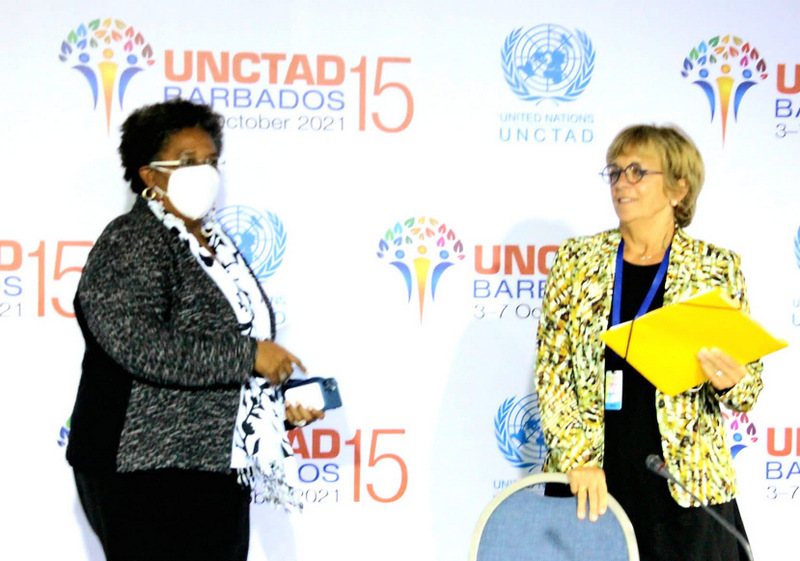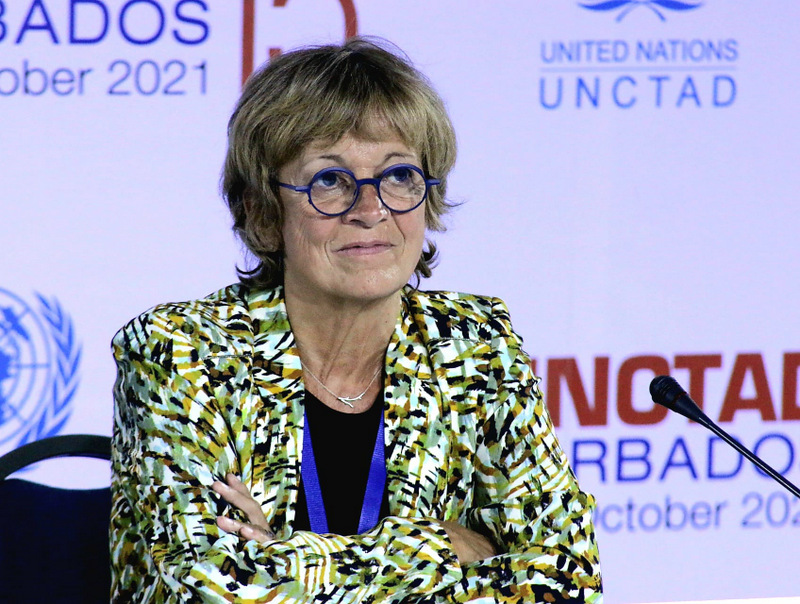PICTURED ABOVE —– Prime Minister Mia Amor Mottley speaking at the closing press conference for the 15th session of the United Nations Conference on Trade and Development (UNCTAD 15), today.
Prime Minister Mia Amor Mottley has identified a number of initiatives to be worked on after the staging of UNCTAD 15 in Barbados, including three upcoming fora on trade logistics, investment and the creative industries.
Ms. Mottley made the comments today during a press conference to share the outcomes of the high-level hybrid meeting, which was held from October 3 to 7.
She said the first meeting would be on trade logistics and it would deal with transport costs and the difficulties now being experienced globally.
“There’s a shortage of containers.… People have to pay a premium just to be able to book a shipping date and to reserve a container even before you pay for the shipping costs. We need to deconstruct and reconstruct all these things and see whether there’s a more efficient and effective way of doing it….
“On [the issue of] creative industries, we know that the Caribbean, more than anything else, is loaded with creativity, and if we are going to, as a small region in the world, get a return from it, we have to be able to tell our stories in the multiple formats that can earn for us,” she stated.
Over the years, the Prime Minister said, UNCTAD had done significant research, and the entity was required to again do some work, for the developing world.
“We need them to look at how we can deconstruct and reconstruct safe assets to ensure that the disparity and borrowing costs between the developing world and the developed world can be removed. So to break that down, why do Ghana and Greece have the same credit rating, but Ghana borrows at a much higher rate of interest than Greece? Largely because of Greece being in the European Union, with the safe assets that are considered part and parcel of the reserve, such that persons can reduce the risk and then they put a higher risk on the rest of us who don’t have those safe assets….
“We also want to see work promoting a global clearinghouse for vaccines, but also for other global public goods that may come…. We believe that UNCTAD can help us with the advocacy to ensure that there’s far greater equity accessing global public goods,” she said.
Ms. Mottley repeated her view that there was a need to move to nutrition security, and again lamented about the digital divide that has resulted because of the COVID-19 pandemic.
She noted that some children did not have access to electricity, tablets or digital content and remained on the “sidelines of life” for the last 20 months.
“This is an unacceptable situation, and…we all agree that we have to work hard to…remove it. I’ve already called on members of the global community to approach the five major tech firms; they have a market capitalisation of $9.3 trillion. It is immoral for children to be without access to affordable rugged tablets to learn, while we continue to enrich a small handful of companies.
“I hope that we can build a global coalition to work with us to be able to identify the manufacturing of a tablet that should cost no more than US40 or 50 dollars, and that needs to last for about three to four years, without the software obsolescence that is built into these…tablets in order to make us buy one every year,” she said.
Ms. Mottley said she was hopeful half of the outlined initiatives could be achieved in the next three years, adding that if that occurred, it meant “we would have done exceptionally well”.

Prime Minister Mia Amor Mottley and Ms. Isabelle Durant, Deputy Secretary General UNCTAD. 
Ms. Isabelle Durant, Deputy Secretary General UNCTAD.
BY SHARON AUSTIN-GILLMOORE




